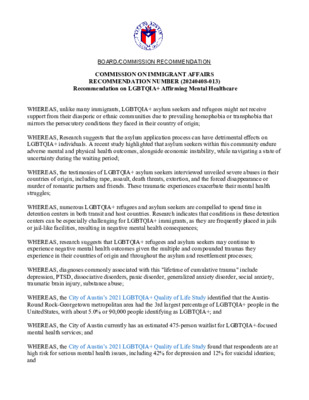Backup — original pdf
Backup

BOARD/COMMISSION RECOMMENDATION COMMISSION ON IMMIGRANT AFFAIRS RECOMMENDATION NUMBER (20240408-013) Recommendation on LGBTQIA+ Affirming Mental Healthcare WHEREAS, unlike many immigrants, LGBTQIA+ asylum seekers and refugees might not receive support from their diasporic or ethnic communities due to prevailing homophobia or transphobia that mirrors the persecutory conditions they faced in their country of origin; WHEREAS, Research suggests that the asylum application process can have detrimental effects on LGBTQIA+ individuals. A recent study highlighted that asylum seekers within this community endure adverse mental and physical health outcomes, alongside economic instability, while navigating a state of uncertainty during the waiting period; WHEREAS, the testimonies of LGBTQIA+ asylum seekers interviewed unveiled severe abuses in their countries of origin, including rape, assault, death threats, extortion, and the forced disappearance or murder of romantic partners and friends. These traumatic experiences exacerbate their mental health struggles; WHEREAS, numerous LGBTQIA+ refugees and asylum seekers are compelled to spend time in detention centers in both transit and host countries. Research indicates that conditions in these detention centers can be especially challenging for LGBTQIA+ immigrants, as they are frequently placed in jails or jail-like facilities, resulting in negative mental health consequences; WHEREAS, research suggests that LGBTQIA+ refugees and asylum seekers may continue to experience negative mental health outcomes given the multiple and compounded traumas they experience in their countries of origin and throughout the asylum and resettlement processes; WHEREAS, diagnoses commonly associated with this "lifetime of cumulative trauma" include depression, PTSD, dissociative disorders, panic disorder, generalized anxiety disorder, social anxiety, traumatic brain injury, substance abuse; WHEREAS, the City of Austin’s 2021 LGBTQIA+ Quality of Life Study identified that the Austin- Round Rock-Georgetown metropolitan area had the 3rd largest percentage of LGBTQIA+ people in the UnitedStates, with about 5.0% or 90,000 people identifying as LGBTQIA+; and WHEREAS, the City of Austin currently has an estimated 475-person waitlist for LGBTQIA+-focused mental health services; and WHEREAS, the City of Austin’s 2021 LGBTQIA+ Quality of Life Study found that respondents are at high risk for serious mental health issues, including 42% for depression and 12% for suicidal ideation; and WHEREAS, the City of Austin’s 2021 LGBTQIA+ Quality of Life Study respondents reported having to put off getting health-related services in the past 12 months because of the cost of dental care (29%), mental health care (21%), medical care (18%), and gender-affirming care (9%) among the top services avoided due to cost; and WHEREAS, the City of Austin’s 2021 LGBTQIA+ Quality of Life Study respondents were asked about how they rate their overall mental health since the pandemic, more than half (52%) of the 1,882 respondents rated their mental health as fair, poor, or very poor, a sizeable increase in mental health concerns; and WHEREAS, nearly half (45%) of respondents in the Austin-based QWELL Community Foundation’s 2021 survey rated their mental health as poor or fair; and WHEREAS, according to the 2022 Austin Public Health Community Health Assessment, there exists significant mental health needs including stigma and limited access to mental health care. Among Travis County residents, the suicide rate was 12.2 deaths per 100,000 population and highest among males (18.5 deaths per 100,000 population) and White residents (17.1 deaths per 100,000 population) in 2016- 2020. In 2020, a higher percentage of females (33.0%) compared to males (20.9%) reported poor mental health, and the prevalence of poor mental health days has increased by 7 overall for both genders. In the same year, a higher percentage of Hispanic/Latino adults (31.5%) reported poor mental health compared to White (26.3%) and Black/African American (22.9%) adults. In 2020, the highest proportion of adults experiencing poor mental health was seen among adults aged 18-29 (32.6%) and 30-44 years of age (34.3%); and WHEREAS, of the seven million dollars of mental health funding in FY24 social service contracts, only $161,673 (2%) provides LGBTQ-focused mental health services WHEREAS, according to a 2019 study, peer support has a long history in formal mental health services, dating back to at least the 1920s in the USA. Peer-support programs often involve people who have experienced and recovered from mental health disorders supporting others. WHEREAS, a 2021 study found that connectedness with peers and affiliation with a broader LGBTQ community has been identified as beneficial to those trying to cope with stressors; and WHEREAS, in the annual Health Disparities Report Card released by Integral Care in FY23, significant findings included that death by suicide was 13.5x higher among Transgender persons served by Integral Care compared to the group with the lowest rates (cisgender females). When stratifying by sexual orientation, death by suicide was also 2.8x higher among Lesbian, Gay, and Bisexual (LGB) persons served and; WHEREAS, since FY2020, existing health equity contracts funding LGBTQIA+ services have not received a cost-of-living increase; and WHEREAS, all current health equity contracts will compete as part of a competitive RFP process for FY 2025 NOW, THEREFORE, BE IT RESOLVED, that the Commission on Immigrant Affairs recommends that the Austin City Council directs $300K annual funding for culturally appropriate free or low-cost LGBTQIA+ affirming mental healthcare, and/or peer support services. Additionally, we recommend the LGBTQ Quality of Life Advisory Commission be included in drafting the scope of work for the request for proposal process. Date of Approval: _____________________________ Motioned by: Commissioner Seconded By: Commissioner Attest: _____________________________________________ (Staff or board member can sign) For: Against: Abstain: Absent: